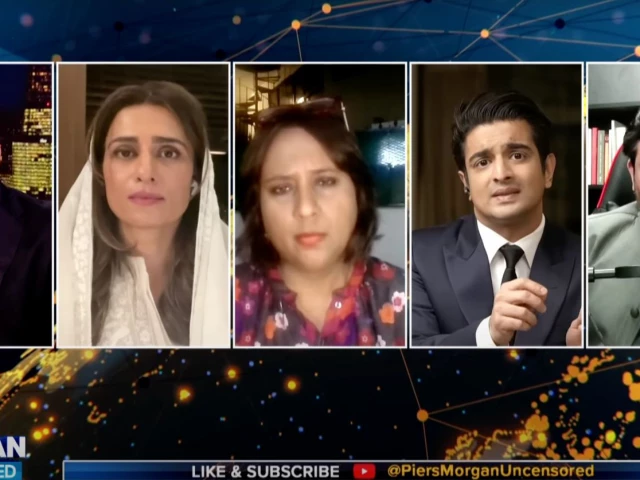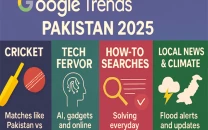Who invited BeerBiceps? Piers Morgan's panel lineup marks a new low in India-Pakistan discourse
In this multiverse of madness, Pakistan’s ex-FM, Hina Rabbani Khar, is joined by two podcasters and Barkha Dutt

By all accounts, the recent Piers Morgan Uncensored episode on India-Pakistan relations should not have been watched, let alone dissected. And yet, here we are, post-morteming a panel discussion featuring former Pakistani foreign minister Hina Rabbani Khar, Indian journalist Barkha Dutt, and — why not — two podcasters: Pakistan’s Shehzad Ghias Shaikh and India’s Ranveer Allahbadia, better known to his following as BeerBiceps. Piers, who introduced the latter two as “young influencers,” offered no further justification for their presence beyond the implicit logic of online virality: if they have a platform, surely they have something to say.
In the case of podcasters, they are often brands first, people second. It’s a curious question in these times of crisis, where every industry, from news to entertainment, is coming to terms with social media personalities. Can the ones beholden to the algorithm speak the truth when the time comes?
Neither Shehzad nor Ranveer has much international appeal, which means they’re doubly bound to their domestic echo chambers. After the whole India’s Got Latent debacle, Piers should know better than to expect Ranveer to challenge the official line, especially when the very state he represents has cracked down brutally on stand-up comedians for a joke about incest, a trope that basically fuels half of Western prestige TV (see: Game of Thrones).
While Shehzad isn't strictly an entertainment podcaster, Ranveer very much is. And Piers seems perfectly aware of this. His promotion tactics rely on zingers engineered for the comment section brain — soundbites that rot your cortex but boost your CTR. Take, for instance, the clip he shared of Shehzad quipping, “I've now figured out why he's called BeerBiceps, because what he said sounds like the most drunk sh*t I’ve heard in my life.” It’s funny. But also, is that really the takeaway you want to amplify from a televised debate between representatives of two nuclear-armed states? A comedy roast?
"I've now figured out why he's called Beer Biceps - because what he said sounds like the most drunk sh*t I've heard in my life."
— Piers Morgan Uncensored (@PiersUncensored) May 12, 2025
Watch Piers Morgan's debate on India and Pakistan in full 👇
📺 https://t.co/Qdt5aeDU8q@piersmorgan | @Shehzad89 | @BeerBicepsGuy pic.twitter.com/PZaEwTTQcM
“Pakistan has become the terror hub,” declares Ranveer, an odd line coming from someone who doesn’t even look old enough to remember when that phrase was doing the rounds in Western media with any real conviction. He’s about a decade too late to be handing out Islamophobia lollipops to the West. And honestly, are we really expected to take political analysis from a guy who believes that masturbation shortens your penis? Maybe all those years of “no fap” are finally culminating in one long, saffron release.
Shehzad, for his part, fares better — if only because he appears less eager to please. Still, his analysis is hemmed in by a certain neoliberal decorum, a kind of progressive coyness that refuses to name Indian-backed proxies in Balochistan lest it appear to “disown” Baloch resistance. But even when Shehzad rightfully calls out RSS’s involvement in the Samjhauta Express attack and the 2002 Gujarat riots, the screen practically starts vibrating with Barkha and Ranveer aggressively shaking their heads, as if trying to physically repel the facts.
Multiverse of madness
From the outset, Piers begins the circus with a straight-faced absurdity that he cooks up with General Wesley Clark, a retired US Army officer. “There are a lot more important issues in the world than fighting about Kashmir,” says Clark in a panel of South Asians, in a segment ostensibly about Kashmir. His follow-up, “Pakistan and India both crave Kashmir — it’s an attractive vacation spot,” is the sort of blithe statement that would be laughable if it weren’t so hauntingly reflective of the trivialisation at play. That the region in question is one of the most militarised zones in the world, where grave human rights abuses have been reported for decades, is apparently less compelling than its tourism potential and strategic promise. Never mind asking a Kashmiri — none were invited.
It’s hard to justify Barkha’s inclusion in the lineup when her X post falsely claiming that the Indian Navy had attacked Karachi Port is still unapologetically up. Her subsequent lamentations feel not only dated but hollow — “stop both-siding jihadi terrorism” and “a Pakistani killed Daniel Pearl” — lines that once might’ve felt incisive but now read like they’re aimed at a white audience that just wants a reason to keep hating the “Muslim.”
BREAKING @themojostory - our Navy has targeted the Karachi Port - as part of the massive ongoing retaliation in response to Pakistan missiles and drones targeted at multiple locations in India including Jammu airport, more details awaited - watch - https://t.co/UGMlpvcLU5
— barkha dutt (@BDUTT) May 8, 2025
The rest of her speech is a nuance-starved summary even Grok could churn out, minus the dramatics. Why bother watching her recite warmed-over talking points when you could glean the same sentiments from ten minutes of doomscrolling on X? If this is the extent of Barkha’s analysis, maybe it’s time to pivot to a profession that demands a little less credibility, fact-checking, and absolutely no spine.
And yet, sitting beside her, Hina manages to hold the kind of composure that should be the bare minimum in any serious exchange. You don’t have to be a fan of her to acknowledge the quiet discipline with which she listens — calm, neutral, unflinching. In contrast, Barkha resorts to odd little gestures of protest, repeatedly raising her hand like a sulking backbencher desperate to be called on.
When Piers asks how India should have responded to Pahalgam, Hina shoots back with the obvious counterpoint: “Why are you not asking me how Pakistan should have responded to the Jaffar Express in Balochistan?”
Piers, in his signature condescension, scolds her: “I don’t like it when guests start to play whataboutery a little too early in the debate. I brought you guys together to debate what’s happened in the last two weeks, not the whole history.”
But of course, he has no issue when Barkha delivers her own Grok-style recap of Pakistan’s “terror legacy.” Historical context, it seems, is only off-limits when it’s inconvenient.
History who?
India has long insisted that Kashmir is an “internal matter,” allergic to even the whiff of international mediation. A similar refrain echoes from many Indian progressives when Pakistan is mentioned — an attempt to bracket Hindutva’s steady fascist creep as strictly ghar ki baat, a family affair best left unexamined. But moral high ground is a tricky perch to claim when the terrain below you is already buckling. While Pakistan’s proxy networks have largely dwindled into dysfunction, their Indian counterparts — the TTP and BLA — used the recent four-day skirmish to sharpen their claws. The BLA even offered to serve as India’s militant arm within Pakistan’s borders should tensions escalate, in a statement posted to its social media handles on Sunday.
Both India and Pakistan wrestle with centre-periphery tensions, but only one of these states possesses the capacity and ideological momentum to project control beyond its own borders. Yes, Pakistan is still clawing at the residue of 19th-century pan-Islamism, a dream that blinked in and out of existence through the 20th century, and has lingered with embarrassing persistence into the 21st century. But for the better part of two decades, Pakistan’s fiercest battles have been with itself. It has never elected a religious party into national government — only those that flirt with the fringes to secure votes. Self-reflection, in such a context, must not blur into self-flagellation and disable an honest assessment of national dysfunction.
It also helps to remember that the same X (formerly Twitter) that now houses armies of our patriotic “cyber warriors” was, until recently, outright banned in Pakistan, not for national security, but for the sin of enabling dissent. While India banned TikTok and 58 other Chinese apps in June 2020, citing data security and border skirmishes with China, Pakistan’s clampdown on X had no external enemy. The threat was internal, an increasingly vocal population expressing discontent with a state too busy fighting its own shadows.
Pakistan’s fragmented state structure, its ever-evolving power dynamic between the military and civilian government, and a long history of electoral disillusionment make it frankly incapable of imagining — let alone orchestrating — the complete dismantling of India.
For the terminally online
India, by contrast, seems increasingly unable to stay within its borders. The 2023 killing of Sikh separatist Hardeep Singh Nijjar in Canada, and the subsequent expulsion of six Indian diplomats under suspicion, has spotlighted New Delhi’s muscular foreign policy — one that sees dissent, even abroad, as fair game. For a nation so allergic to international mediation in Kashmir, India seems perfectly comfortable extending its own security apparatus into Canadian suburbia.
Yet, Barkha claims that India, on account of being the “fourth largest economy,” would “love to ignore Pakistan.” It certainly must be difficult to ignore a country while your cinema is fixated on its destruction and your news cycle is one meme away from frothing at the mouth.
But these “sentiments” come as no surprise to anyone remotely familiar with Piers' brand. The entire Piers Morgan Uncensored episode plays like a show for people who don’t have Twitter/X, because those of us who do, we’ve already seen what a futile, ungrounded, aggression-laced shouting match dressed up as “debate” looks like. At least online, you can refresh the timeline and jump from a K-pop dating scandal to an influencer breakup in seconds. But here, you’re trapped in the colonial hangover of a white man refereeing two nuclear neighbours like it's a pub brawl. Oh look, they look the same and they’re stupidly fighting over Kashmir—lol.
Reeling from what one X user aptly dubbed as a “nightmare blunt rotation,” one can only hope that Barkha’s India — and the foreign approval it so desperately courts — will finally take its own advice and learn to “ignore” Pakistan.
Have something to add to the story? Share it in the comments below.



















COMMENTS (2)
Comments are moderated and generally will be posted if they are on-topic and not abusive.
For more information, please see our Comments FAQ